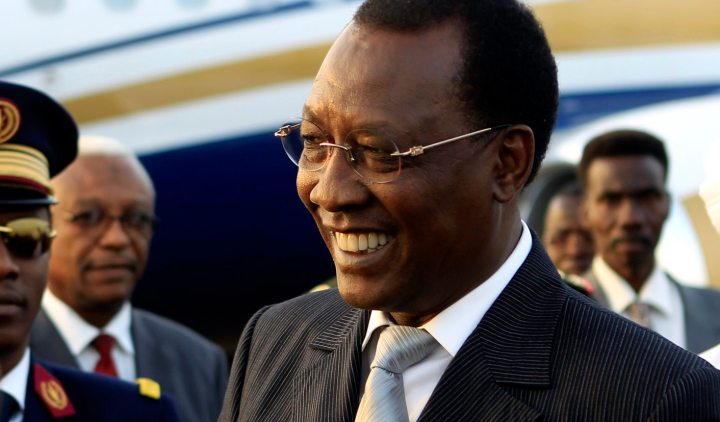Africa
Who’s afraid of big bad Chad?

There are some countries that make the headlines regularly. Others operate in the shadows, out of sight and mostly out of mind. Chad is one these countries, but this doesn’t mean it is powerless. Quite the opposite, in fact. As South Africa exits central Africa with our tail firmly between our legs, maybe we should have remembered this. By SIMON ALLISON.
There is a delicious irony in the fact that as Jacob Zuma was about to touch down in Ndjamena, Chad’s dusty capital, the news broke that Chad’s soldiers may have been involved in the fatal fire fight in Bangui – on the other side. Talk about awkward diplomatic receptions.
It’s hard to determine the veracity of this claim, especially as it comes from disgruntled former CAR president and now president-in-exile Francois Bozizé, but given Chad’s long track record of meddling in the Central African Republic and other neighbouring countries, it’s unlikely but certainly not out of the realms of possibility. What we do know for sure is that Chad is intricately involved in the events in the CAR, as it has been for years, and knows this part of Africa far better than South Africa can ever hope to.
In fact, Chad’s president, Idriss Déby, doesn’t just know the region – he’s been pulling its strings (or trying to, at least) for the last decade.
It began, like so many other central African power shifts, with a coup. In 1990, Déby, a disaffected general, turned against his former benefactor Hissène Habré, dumping Habré out of office and taking the presidency himself. In this, incidentally, he is not unlike Bozize or the CAR’s latest president by decree, Michel Djotodia.
Déby, despite his decidedly authoritarian ruling style, has never really managed to consolidate power. But he has stayed in power, despite a near-continuous rebellion waged against him by various dissident groups and occasionally strong opposition from neighbouring countries. As Foreign Policy magazine observed in 2010:
“A member of the tiny Zaghawa tribe that makes up just 1.5% of Chad’s 10 million people, [Déby] has been betrayed at various points over his two tumultuous decades in power by his army, his clan, and even members of his close family. His prodigal son Brahim, once considered his heir, was murdered in Paris in 2007, forced to inhale the powder from a fire extinguisher… Déby is not the most famous authoritarian ruler around, nor the most effective. But his staying power – and the outside world’s inattention to it – is remarkable.”
A big factor in Déby’s Machiavellian power games has been his manipulation of regional conflicts to suit his own best interest. In the CAR, we find a wonderful example of this. Last decade, Chadian rebels were using the north of the CAR as a base from which to regroup and launch attacks on the Chadian government. This was a problem for Déby, but he found an elegant solution in the form of central African exile Francois Bozizé. With Chad’s help, Bozizé was able to seize power from President Ange-Félix Patassé. Chad then played a crucial role in keeping Bozizé in power, with Chadian special forces used to attack central African rebels (along with any Chadian rebels still using the CAR as a base).
This history between Déby and Bozizé makes the events which unfolded in Bangui all the more puzzling. Everyone’s asking what exactly the South African troops were doing there, but it’s worth questioning wondering whose side the 2,000-plus Chadian soldiers – sent in originally to fight the rebel movement – were really on?
Chad’s military adventures in the region are not limited to the CAR. There is a long history of bad blood with Sudan, with both sides accusing the other of supporting rebel groups operating on their territory. Meanwhile, the relationship between Chad and Muammar Gaddafi’s Libya was close, with Gaddafi ploughing plenty of money into the country and Chad offering regional support in exchange.
Right now, however, Chad’s reach is extending all the way to Mali where Chadian special forces – some 2,000 of them – are offering vital support to the French and Malian armies in the fight against northern Islamist rebels. In fact, Chad’s fighters are the best of the bunch. “This is the sort of background in which they feel the most at home. This is like northern Chad, this is the desert, this is rocky terrain,” said Francois Heisbourg, a special adviser at the Paris-based Foundation for Strategic Research, speaking to the Christian Science Monitor. “They are fully acclimatised. [38°C] at noontime doesn’t scare them.”
But what exactly are Chad’s soldiers doing so far away from home? Deby is not exactly known for his commitment to good governance and human rights at home, so it seems unlikely that he’s worried about the lack of these noble principles in Mali. More likely, it’s a combination of other factors that work in his self-interest: first, that maintaining a battle-hardened army requires battles to harden it; second, that committing 2,000 soldiers to fight in another country means there are 2,000 fewer soldiers who might consider toppling him; third, that participating in international operations is an excellent way of discouraging international criticism of his own regime; and fourth, that it’s also a good way to increase his regional clout.
This last point is crucial. As leaders around him have been deposed (like Patassé, Bozizé’s predecessor), killed (think Gaddafi) or forced into bruising concessions (Sudan’s Omar al-Bashir), Idriss Déby has quietly kept his grasp on power and increased his influence in the region – and the continent. Before getting involved in central Africa, maybe South Africa should have taken a bit more note of this. DM
Photo: Chad president Idriss Deby smiles after arriving at Khartoum Airport on an official visit February 7, 2013. REUTERS/Mohamed Nureldin
















 Become an Insider
Become an Insider